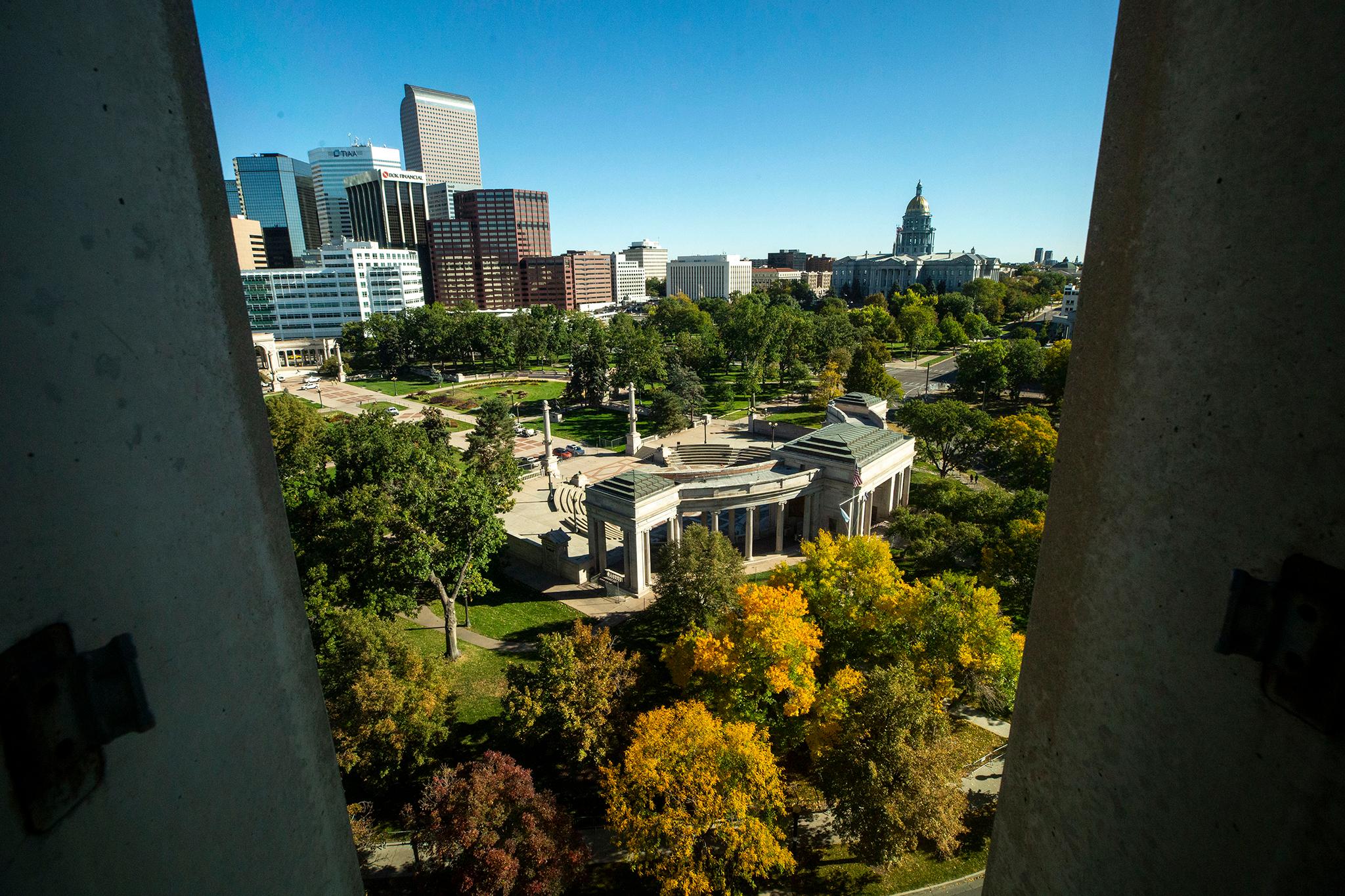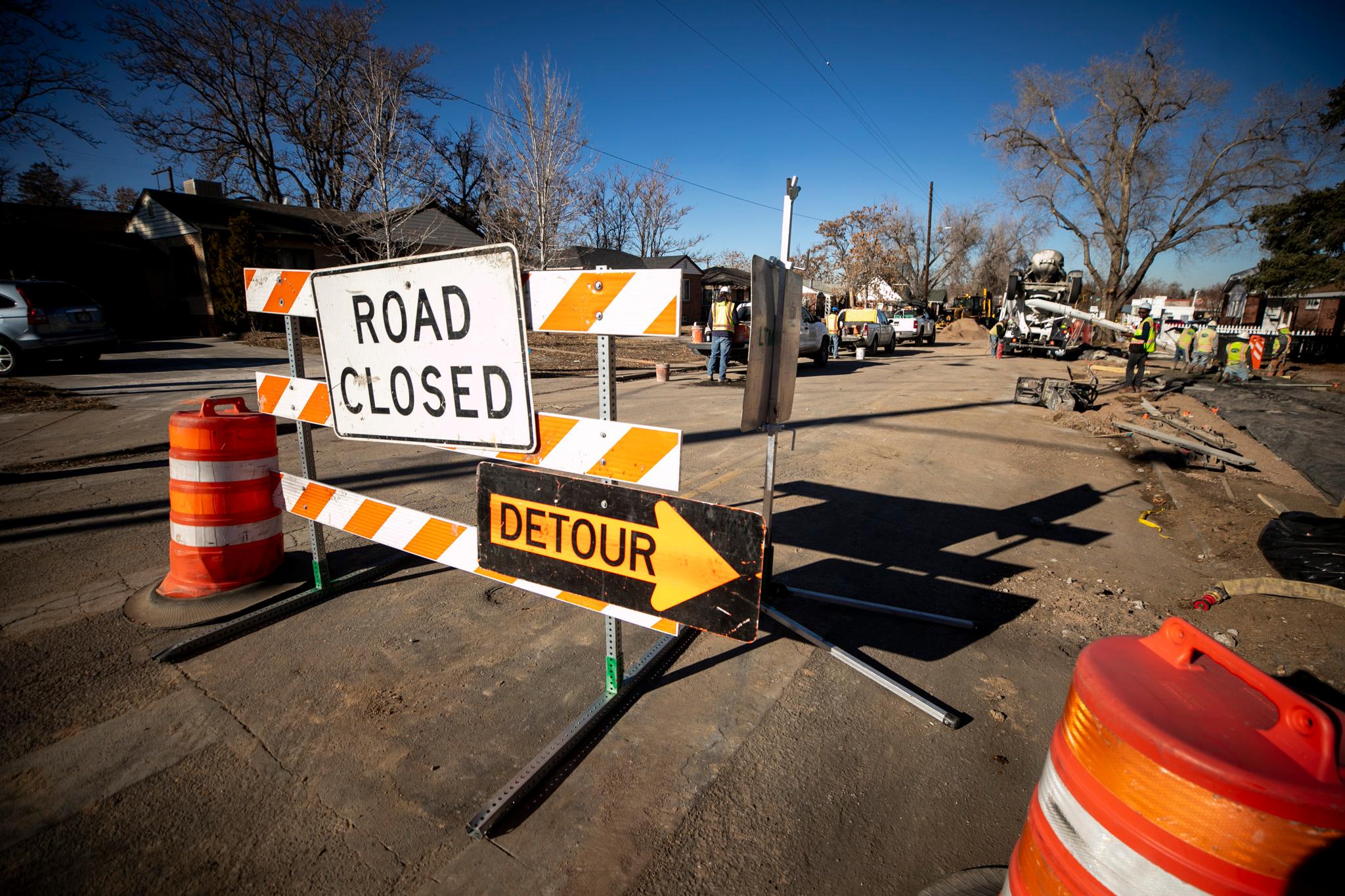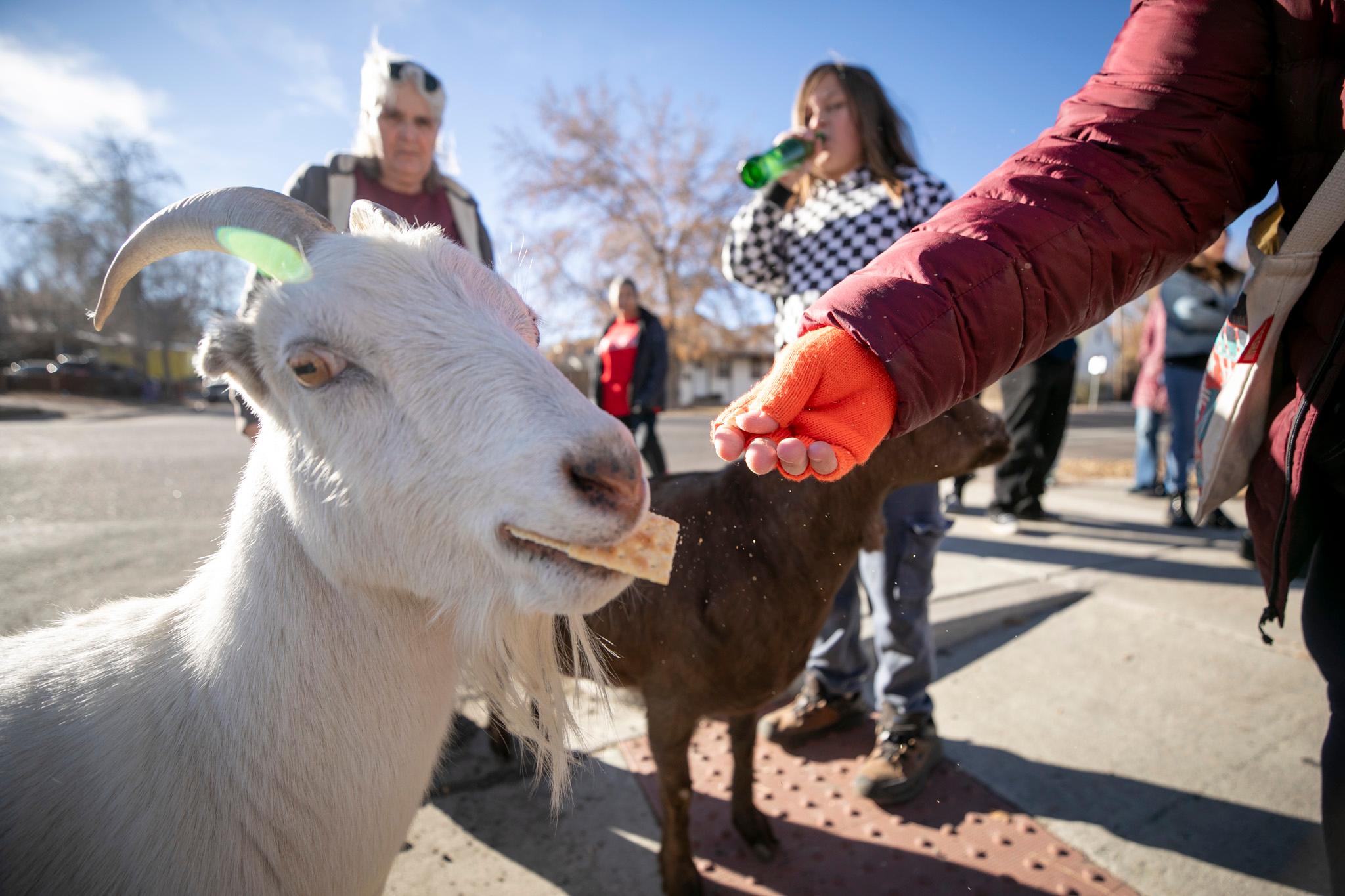At just eight years old, Mo is the youngest staff member at Mirror Image Arts. The nonprofit works to disrupt the school-to-prison pipeline by bringing theatre programming to youth in schools and detention centers around Denver.
Mo is in the third grade and says school is fun sometimes and boring sometimes. He likes to play video games, especially Mario Kart. He also happens to be a puppet -- an orange, fuzzy little monster with tufts of blue in his fur, striped horns and lots of energy.
"Mr. Michael," an adult friend who works with Mo at Mirror Image Arts, promised Mo that if he spoke to Denverite they could go out for ice cream after.
"I love Mirror Image Arts," Mo told us in a Zoom interview. "I really have a lot of fun. I get to see a lot of kids. And they like to ask me questions. And we have a lot of fun."
Mo helps out with the nonprofit's Curious Courage program for second and third graders. He visits schools and plays theatre games with the students. Often, they put on a mini play called "The Coyotes and the Painter." Mo typically plays painter, and the kids play the coyotes. The teacher reads the story out loud, and the kids act it out. He said if the teacher says the painter goes to sleep, Mo pretends to sleep. If the painter gets angry, Mo acts out being angry. If the teacher says the characters have a dance party, the kids and Mo dance.
Mo also talks to the kids about their lives.
"I like to share stories about times I've shown courage," Mo said. "And I like to talk about some times with experiences that I have in my life. And I like to talk about, like, what's going on in my home."
Mo has a twin brother named Bo who looks just like him and a sister Mia who's funny and "a little bit sneaky" because she's not potty-trained yet. His mom is a nurse who often works night shifts, so Mo spends a lot of time with his grandma. Mo talks to the kids about feeling lonely, and about feeling different from other kids at school.
"When I'm working with young people, what I hope for them is to be able to talk about how they feel and their emotions, and to know that their emotions are information," Mo said. "So you can feel something, and a feeling is not bad or good. It's just telling you what's going on in your mind."
Mirror Image Arts uses participatory theatre to teach life skills to students in the Denver area. Their ultimate goal: to disrupt the school-to-prison pipeline.
Their work is rooted in Theater of the Oppressed, a form of theatre education created by Brazilian playwright Augusto Boal in the 1960s that now serves as a model for conflict resolution and drama therapy. The idea is to allow participants to try out different choices and make mistakes in a safe, supportive environment -- a sort of rehearsal for life.
The nonprofit was founded in 2008 to educate young people about eating disorders and to help them improve their body image through performance. But by 2011, they were struggling to secure funding and almost had to close their doors. Andea Rabold took over as the nonprofit's executive director, and the group started working more closely with teachers and students and administrators to better understand what the community needed.
What they found was that most of the community members they worked with identified bullying as the key challenge students were facing. They got to work researching preventative measures and began teaching social emotional learning through performance in 2014.
It was through that work that they learned about the school-to-prison pipeline. They learned that many schools had adopted zero-tolerance policies for bullying, an approach that can lead to increased police presence in schools, as well as punitive responses to misbehavior ranging from detention to incarceration. They felt that that approach could entrap kids dealing with challenges like learning disabilities, poverty, abuse, trauma or neglect in legal systems. They were surprised to see how quickly kids could become criminalized for mistakes they made in school, and that once kids enter the criminal legal system, it's hard to get out.
"Once they engaged with the criminal legal system, that was the moment of no return," Rabold said. "And so if we were truly trying to be preventative, maybe we should start paying attention to this pipeline that's been created between our schools, which are supposed to be a safe haven, and these really harsh disciplinary spaces on the other side."

By 2020, Mirror Image Arts had fully shifted to focus on disrupting the school-to-prison pipeline.
The nonprofit partners with schools, detention centers and step-down facilities in the Denver area to provide theatre programming to students in grades 2-12. They also partner with groups like Boys and Girls Club to identify which school and facilities in Denver are most impacted by the pipeline and would most benefit from their programming.
The staff, which is made up of professional performers, are all Youth Mental Health First Aid certified, and received training in things like trauma-informed care, healing-centered engagement, positive youth development, restorative practices, culturally responsive teaching and identity and privilege.
The performers visit schools and detention centers, engaging the students in exercises and performances designed to help them understand the world around them, what they have control over, and how they can shift their futures. For example, the actors might perform a play about a conflict between friends. The conflict will escalate, and then the staff will pause it and ask if any of the students want to step into the role of one of the characters to try to resolve the conflict by trying out different actions.
"So here's your incubation space to practice a new technique or practice something you've been learning in the program that might actually help de-escalate instead of escalate conflict," Rabald said.
Older students, like high schoolers and incarcerated youth, can take it a step further. They're invited to identify a challenge impacting them and to build their own scene around it. Mirror Image Arts also offers longer programs in which students put on a published play or create their own from scratch.
One way the nonprofit is working to disrupt the pipeline is by expanding the students' social-emotional development.
They focus on restorative responses to students rather than punitive ones. Program and partnership director Maya Osterman-Van Grack said that by acting out scenarios, students can learn how to relate to people and handle conflict as it appears in their lives.
"When an individual is more capable and able to understand the world around them, label it and be in relationship with other people, that collaboration and generative conflict can help move community forward," Osterman-Van Grack said. "So we really root in restorative practices as a way to come together to collectively understand what's happening in community and how can we collectively co-create, how to shift that to a more ideal future."
Another method of disrupting the pipeline is simply connecting students with trusted adults -- both the nonprofit's theatre professionals and the adults already embedded in the kids' lives. Mirror Image Arts works to educate and uplift teachers and counselors at their partner organizations so students can form stronger relationships with the adults in place to support them.
"We know through research that developmental relationships are really critical towards young people being able to graduate, make healthy choices, create healthy relationships moving forward," Osterman-Van Grack said.


Mirror Image Arts has recently started to work to enact change on a systemic level through advocacy. For example, young people who've been incarcerated often have lingering financial obligations, sometimes amounting to triple-figure debt.
"Which in some ways is its own life sentence," Rabold said. Mirror Image Arts is working with policy makers on a bill that would reform or eliminate juvenile restitution fees.
The name "Mirror Image Arts" comes from the group's practice of mirroring their students' experiences through theatre.
The staff present students with short plays and games designed to reflect the communities the young people live in and the challenges they might be facing. The idea is to create a safe space for students to participate in and control their own narratives through improv, games and other exercises.
For example, one character created for the fourth grade program is a seventh grader. Osterman-Van Grack said that's because developmentally, fourth graders look up to older kids.
"We're also trying to help prep them for the types of conflicts or relationships that will show up when they get into middle school," Osterman-Van Grack said.
This character had to take on a lot of responsibility at a young age after a parent died and was often charged with looking after their siblings as they moved from school to school and stayed with different family members.
The program coordinators hope that by participating in these worlds, young people can learn to interact with their communities and communicate productively and effectively, and to develop the tools they need to face challenges as they appear in their lives.
"We all improvise every day," Osterman-Van Grack said. "We all put on different roles based on who we're with and where we're at. So we have the actual tools to be a theatre practitioner. And we just want to create a space to do that to create what we call a 'rehearsal for reality.'"

When the coordinators were creating the curriculum for younger students, they faced a challenge: How might grown-up actors authentically mirror the experiences of a second or third grader?
"That was just a pretty big ask, to be a grown man with a beard and pretend he's an eight year old," Osterman-Van Grack said. "So from a developmental standpoint, it just became very obvious that puppetry would be a wonderful modality to use for that age."
Mo was born in the summer of 2021, designed with the help of a professional puppet maker to mirror the energy and experiences of the youngest students the nonprofit works with.
"They have a lot of energy and behavior that can show up in certain ways based on some of the trauma they've experienced in their life," Osterman-Van Grack said.
Last summer, actor and puppeteer Michael Board II started working with Mirror Image Arts as a program facilitator. He took on the role of Mo.
"I really wanted to mirror the kids that we serve, and where they come from, and the stories that they come from," Board said. "I really wanted them to see themselves in this orange little monster here."
He said that Mo being a monster is a symbol in itself.
"It's OK to be different. And it's OK to come where you come from. And it's OK to feel feelings," he said. "Mo's very emotional. And he's very sensitive. And he's very energetic. And sometimes he has trouble focusing as well. And I think that's something that our youth can relate to."

Mo talks to the kids about loneliness or about feeling different from the other kids and how he's able to overcome those feelings. He walks them through breathing exercises and talks to them about the importance of advocating for yourself and asking for what you need.
"It's really cool to interact with them from the perspective of a little kid just like them. It feels like I'm kind of on the same playing field as them," Board said. "I've just learned so much about what they're thinking about and what they're feeling, and with Mo's story, the connections that they have to having siblings, having parents that maybe work a lot and and can't be around too often. Those are things that I'm kind of learning more about and gaining more perspective about, which is informing how I facilitate our programs as a whole."
The Mirror Image Arts team says it's hard to measure impact because their work is relatively new. It could be years before they know just how much they've helped to disrupt the pipeline.
They regularly survey the students about how they feel about the theatre program. In their evaluations, they've found that 94.3% of students said the facilitator cared about them, 93.5% said the facilitator helped them learn something new about themselves and 91% said they better understand how other people in the program feel.
Osterman-Van Grack said that, anecdotally, they see they're making a difference when, after watching the adult actors be vulnerable in their performances, the kids feel comfortable sharing something about their own lives.
She remembers one interaction in particular that she had with two different groups of incarcerated students.
"We asked them, 'If you are locked up, what would make this feel like a place where you're learning and growing and getting yourself ready for leaving here?'" Osterman-Van Grack said. "And two separate groups completely unsolicited -- we were sitting in a circle having this conversation -- and in both groups, they said, 'This. What you all do. If this was just what life was like all the time, then you would be in a better place.'"













